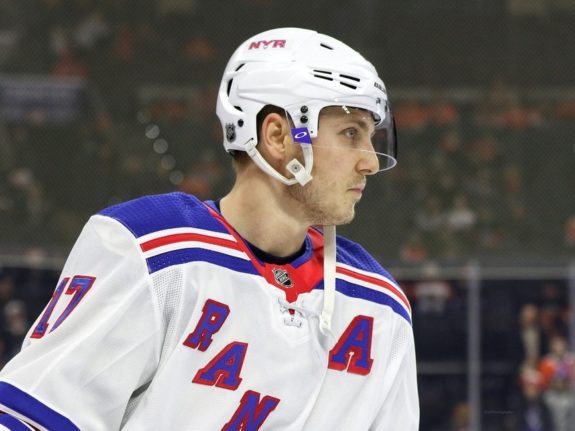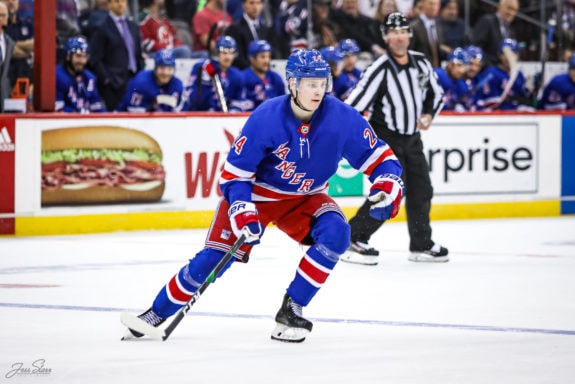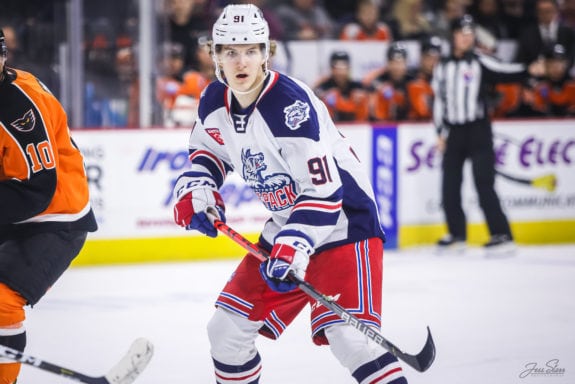The New York Rangers’ trade of defenseman Brady Skjei just before the 2020 NHL Trade Deadline was met with what seemed to be nearly as much fanfare as the long-term signing of star forward Chris Kreider hours earlier. The front office’s ability to improve the club’s salary cap situation by moving Skjei while not compromising the Blueshirts’ unexpected run at a playoff spot this season further highlighted management’s deft and focused handling of the rebuilding plan.
Related: Brian Leetch – The Road to the 1994 Conn Smythe Trophy
The subtraction of Skjei’s unwanted $5.25 million annual cap hit over the next four seasons should prove especially crucial this offseason, with the Rangers interested in re-signing young restricted free agents Tony DeAngelo, Brendan Lemieux, Ryan Strome, and Alexandar Georgiev.
Also without a contract for next season is heart-and-soul forward Jesper Fast, with unrestricted free agency months away for the sixth-round draft pick in 2010. And while the Rangers might now be able to fit a deal for the beloved right wing under the 2020-21 cap as well, with loads of space on tap for 2021-22 and beyond, they might want to consider the painful possibility that doing so might not be the right choice.

There’s zero question about Fast’s value – especially to the only NHL team he’s ever known. Extremely versatile and fundamentally sound, the ace penalty killer can play up and down the lineup and is better offensively than he’s given credit for. He’s even better in the dressing room, a high-character leader that has formed part of the Blueshirts’ backbone for the past seven seasons.
The Rangers supposedly shopped him before the deadline, but there aren’t any indications they did it in a particularly intense matter – never engaging any team in serious talks. Fast is expected to remain on the right wing with Ryan Strome and Artemi Panarin as one-third of the dynamic line that has helped power the Blueshirts’ push for the postseason.
Yet despite all of Fast’s contributions, choosing to re-sign him could end up hampering the rebuild – as terrible as that sounds.
Young Right Wings Complicate Fast’s Presence
As seamlessly as Fast fits in everywhere, his teaming with Panarin and Strome this season has had more to do with a dearth of suitable options on the wing to fill out that forward unit. While Fast’s defensive prowess does work well with Panarin’s dynamic and aggressive offensive approach, head coach David Quinn added Fast to the line in part because of the club’s long-term approach at the moment.
Related: Maple Leafs – Whipping Boys from the Last Decade
The Rangers, determined to take it slow with No. 2 overall pick Kaapo Kakko, weren’t prepared to force the 18-year-old rookie onto one of the top two lines this season. It’s a decision that looks pretty good at this point with the Finn experiencing the ups and downs of being a teenager in the NHL – but also unburdened by pressure to produce regularly while he develops on the third line.
Another highly-regarded young winger, Vitali Kravtsov, proved wholly unready for the demands of the NHL as he’s undergone a long journey through the season – none of it spent on Broadway. Needing a veteran to fill out his top six, Quinn knew he could turn to Fast and get results, and that’s of course been the case. No doubt buoyed by Panarin’s brilliance, Fast has recorded 12 goals, 16 assists and a plus-15 rating in 2019-20.
Yet it’s the presence of Kakko, Kravtsov and another high-ceilinged young forward, Julien Gauthier, that should be the primary reason giving the club pause on the question of re-upping Fast.

The hard truth is, despite Panarin experiencing a career season playing largely with Strome and Fast, the Rangers would likely prefer more offense on his opposite wing over the long term. Kakko presumably wasn’t drafted second overall to play on the third line for long, as he’s ticketed for an inevitable top-six role on the right side.
Pavel Buchnevich currently occupies the right wing with Kreider and Mika Zibanejad on the Rangers’ other top forward unit, and he’s made strides in his fourth season. Even if he were to be traded, opening up that spot for Kakko, team brass has to be envisioning a more skilled offensive winger teaming with Panarin in the near future.
Perhaps that’s Vitali Kravtsov, the ninth overall pick in 2018. Maybe it’s February’s acquisition of Julien Gauthier, the huge forward whose eye-opening speed reminds many of Kreider’s uncommon talents and who might complement Panarin’s passing well.
While Fast can play anywhere, he’s not suited to extended duty in the top six. His ability to move up, as he’s often done temporarily in the past, has been critical in this season of growth, but leaving him there over the long haul might not be the best decision for the club’s long-term interests.

The Rangers would certainly like to see Buchnevich continue his rise and maintain his easy chemistry with Kreider and Zibanejad, a unit that’s meshed well for several seasons now. They’ve got big plans for Kakko and they’re still hoping their investment in Kravtsov, who’s finally showing signs of finding his game at AHL Hartford, eventually bears fruit.
That’s three highly skilled young right wings, and make it four with Gauthier, the 21st overall pick by the Carolina Hurricanes in 2016. Even if one of those four fails to stick, where does that leave Fast?
The Rangers can certainly stash him on a fourth line, an assignment he’ll, of course, handle with professionalism and aplomb. However, the days of Fast falling into the “bargain” category are coming to an end. He’ll be looking for a decent raise from his $1.85 million salary this season, and more importantly, some security in the form of perhaps a three-year deal – which he might get on the open market. Are the Rangers prepared to make that kind of financial commitment to someone who could find himself a consistent fourth-liner in the near future – and who could end up blocking a younger, cheaper and eventually, better offensive player?
Could Fast Be Fodder for Expansion Draft?
The Rangers should have about $17 million in cap space for next season. That’s a healthy amount, but it’s not unlimited. Forcing the issue with Fast when there are other priorities could come back to bite the club. The front office may still face hard decisions on who stays and who goes next season, even after the Skjei trade.
Fast, quite simply, is beloved at Madison Square Garden and probably always will be. Cutting ties with him wouldn’t be easy. Yet that front office, led by president John Davidson and general manager Jeff Gorton, has shown over the past two years that it won’t hesitate to make big changes in the best interests of the club – and both men have built up quite a bit of professional capital with their extended hot streak of personnel moves that has the Rangers appearing to be on the verge of returning to contention.
There does exist a cold, hard and substantially cynical reason for re-signing Fast – the 2021 expansion draft. All teams must expose two forwards that are under contract for the 2021-22 season and have played at least 40 NHL games in 2020-21 or 70 NHL games total since the start of 2019-20. Right now, the only Rangers forwards who fit that criteria are Panarin, Zibanejad, and Kreider, and they’ll have to be protected due to no-move clauses (Kakko will be under contract for 2021-22, but he’s exempt and the Rangers obviously wouldn’t expose him anyway). Of course, it’s not as if the Rangers wouldn’t have protected those three veterans otherwise.
Center Brett Howden could be one option to be exposed to the new Seattle franchise, but he’s not signed for 2021-22, and there aren’t any other realistic options at this point.
If Fast is re-signed, only to then be exposed in the expansion draft, it would hardly be out of character for him. The guy known for his undervalued contributions could find himself in the position of allowing the Blueshirts to protect more of their future – one that Fast may not be around to see.
Though it wouldn’t be his choice, one more selfless, team-first act would perfectly cap Fast’s Rangers career. Hopefully, the often-overlooked supporting cast member who performs on Broadway will always be fully appreciated there, whether he stays or goes.